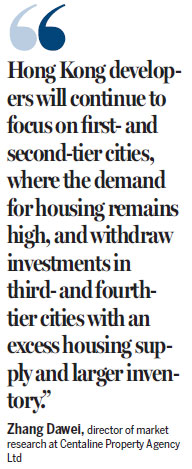Hong Kong developers start trimming mainland portfolio
Updated: 2015-06-10 07:41
By Fan Feifei(HK Edition)
|
|||||||||
Continued economic slowdown on the mainland, coupled with high property inventory that has been partly blamed for depressed homes prices, have been reflected in moves by some of Hong Kong's biggest conglomerates to wind down their investments across the border.
The Wharf (Holdings) Ltd, which was among the first Hong Kong groups to invest on the mainland in the 1980s, has joined Li Ka-shing's empire in trimming its operations on the mainland, saying it will reduce its exposure to five or six mainland cities from 14.
The group, founded by the late shipping magnate Pao Yue-kong and which has extensive interests in the real-estate, hotel and telecommunications sectors in Hong Kong and on the mainland, sees the "golden age" in the mainland property market as over.
Peter Woo Kwong-ching, Wharf's former chairman and now senior counsel, shed some light on the company's decision when he told a shareholders' meeting recently:"The development environment on the mainland is quite different compared with previous years, and they meet up with more difficulties and challenges, especially in the third- or fourth-tier cities".
The property industry, he believes, has entered a period of management and operation.
"The mainland property market will inevitably make adjustments amid a continuing economic downturn and high inventory. Hong Kong developers find their business growth in the mainland market not ideal, and the rate of capital appreciation couldn't keep up with that in Hong Kong," said Huang Lichong, a senior real-estate analyst.
However, the area of their disinvestment is confined mainly to third- and fourth-tier cities, while first- and second-tier cities will continue to their strategic focus.
"The property sector's gross profits are on the decline. In the short term, we're not confident about the mainland's residential market," said Wharf's new chairman Stephen Ng Tin-hoi.
Wharf China Development Ltd - the Wharf Group's property-investment arm on the mainland - currently owns a land bank of more than 11 million square meters on the mainland, with residential-and-commercial investments spanning 15 cities, including the provincial capitals of Chengdu (Sichuan) and Changsha (Hunan), as well as Chongqing Municipality and the scenic city of Suzhou in Jiangsu province.
Experts point to "maladjustment" in the mainland environment as among the prime reasons for Hong Kong enterprises shrinking their operations there.
Guo Yi, chief marketing officer of Yahao Real Estate Selling and Consulting Solution Agency, noted Hong Kong's scarcity of land and the tendency of the city's developers to hoard land for long periods, as well as their preference for long-term investment.
"However, this approach is not feasible on the mainland. They're not allowed to hoard land there. Moreover, the implementation of a series of measures by the mainland authorities to cool the property market has ruffled potential homes buyers," he said.
Huang agrees. "Hong Kong developers, with their slow pace of development, can't raise their turnover, but they still have to pay the land value increment tax (on the mainland). They don't pay such taxes in Hong Kong."
"The scale and speed of their disinvestment will continue to expand, and Hong Kong developers may look to overseas markets."
Li Ka-shing's Cheung Kong Holdings Ltd has been disposing off its mainland properties in recent years.
According to the company's 2014 financial statement, its revenue from the mainland had fallen by more than 60 percent to HK$6 billion last year, while its Hong Kong revenue had gone up by 60 percent year-on-year to more than HK$23.8 billion.
According to recent media reports, Li plans to sell the Shanghai International Capital Plaza to a Singapore-based, real-estate private equity fund for about 1.54 billion yuan ($248.1 million).
Early last year, the tycoon completed the sale of Nanjing International Finance Center for nearly 2.5 billion yuan, while his son Richard Li Tzar-kai sold Pacific Century Place in Beijing to Gaw Capital for HK$7.2 billion.
Li Ka-shing is switching his focus to European and other foreign markets, having agreed to acquire UK cellphone operator O2 for $15.3 billion in March this year, with analysts citing the low risk of investment in the European countries.
According to a risk research report by global financial services and investment information group Nomura, which explores the vulnerability of provincial and city-level finances to slower growth, third- and fourth-tier cities on the mainland pose the highest investment risks, followed by second-tier cities. First-tier cities are in the low-risk category.
The report also indicated that the key risk for both residential-and-commercial property investment is oversupply, with property investments having grown rapidly in the past decade, outpacing other economic activities substantially.
In contrast to foreign markets, the mainland's property market is experiencing a slowdown in both demand and average prices.
"The risk of investing in European countries is much smaller than on the mainland," said Guo, adding that developers want to sell their mainland properties and put their money into places that offer higher returns.
Zhang Dawei, director of market research at Centaline Property Agency Ltd, told China Daily:"The business of Hong Kong's top property developers on the mainland only takes up a small percentage among the country's major developers. Their scale and layout are much smaller, being less prestigious than their mainland counterparts."
In his view, Hong Kong developers will continue to focus on first- and second-tier cities, where the demand for housing remains high, and withdraw investments in third- and fourth-tier cities with an excess housing supply and larger inventory.
fanfeifei@chinadaily.com.cn

|
Third- and fourth-tier cities on the mainland pose the highest investment risks, followed by second-tier cities, while first-tier cities are in the low-risk category, according to a risk research report by global financial services group Nomura, which explores the vulnerability of provincial and city-level finances to slower growth. Asia News Photo |
|
Oversupply is the key risk for residential-and-commercial property investment on the mainland, with property investments having grown rapidly in the past decade, outpacing other economic activities substantially, a survey shows. Asia News Photo |
(HK Edition 06/10/2015 page11)

